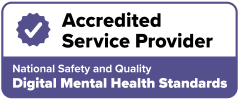How to find trustworthy mental health information
With so much information out there, it can be hard to know if mental health information you’re sharing is accurate and trustworthy.
There are ways to check so that you’re confident in what you’re sharing with someone you’re supporting.
.svg?iar=0&sc_lang=en)
.svg?iar=0&sc_lang=en)
Tips for checking mental health information before sharing
Check the source. Look for information from reputable organisations, like government health departments, mental health charities, or accredited medical professionals. Trustworthy websites often end in “.gov” or “.edu” or are accredited by the Australian Commission on Safety and Quality in Health Care. It’s also worth checking where a website or source of information is published.
Check the date. Mental health research and treatment options are constantly evolving. Look at the publication date to ensure the information is current and reflects the latest guidance.
Look for evidence-based information. Personal experiences and stories are valuable when supporting someone with their mental health, to help them feel less alone. It’s also important to remember that dependable mental health information is based on research and clinical evidence. If a source is making claims about mental health treatments or support, check that it’s backed up with scientific studies or expert guidance.
Beware of red flags. Be cautious of websites or articles that promise quick fixes, use sensational language, or push products as a solution. Mental health is complex, and recovery often takes time, patience and the right kind of support.
Cross-check information. Don’t rely on just one source. If you find helpful advice, check it against other sources to make sure the advice is consistent with good mental health management.
Look out for the National Safety and Quality Digital Mental Health Standards (NSQDMHS) accreditation badge. Digital mental health services, like online therapy platforms or apps, can be accredited by the Australian Commission on Safety and Quality in Health Care as being safe, clinically sound and effective.










.svg?iar=0)




